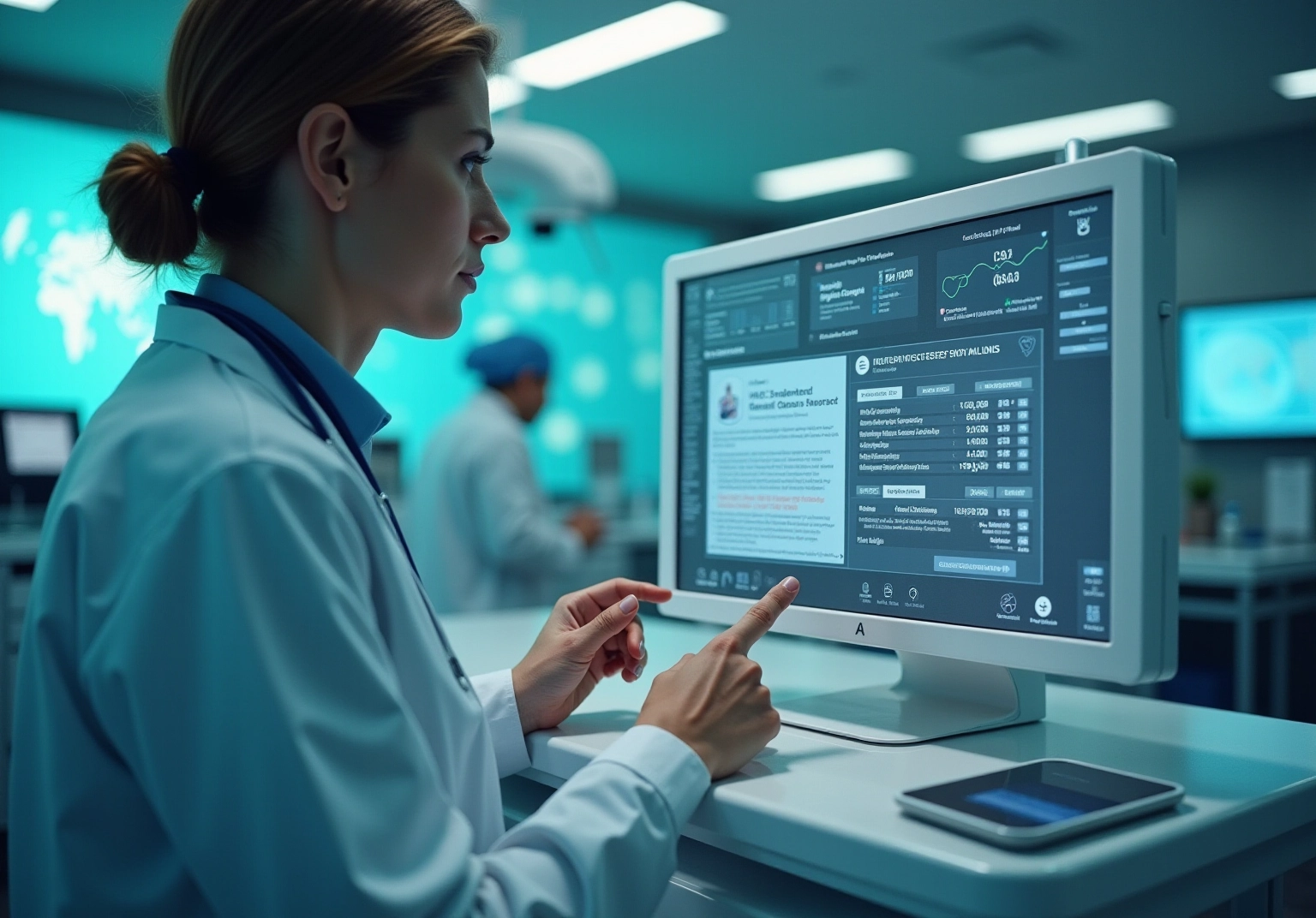
The article examines the prevailing trends and insights regarding the integration of artificial intelligence (AI) within the healthcare market. It emphasizes critical components such as:
Collectively, these elements illustrate how AI significantly enhances operational efficiency and patient care in healthcare settings.
The integration of artificial intelligence in healthcare transcends mere trend; it is fundamentally reshaping the landscape of medical services in profound ways. Innovations such as AI-driven coding solutions and predictive analytics empower healthcare providers to explore new avenues for enhancing patient outcomes and streamlining operations. Yet, as reliance on AI technologies increases, so too do the challenges related to data security, ethical considerations, and the necessity for effective collaborations.
How can the healthcare industry fully harness the potential of AI while adeptly navigating these complexities? This article delves into seven key insights that illuminate current trends and future prospects in the AI healthcare market, offering a roadmap for stakeholders aiming to thrive in this dynamic environment.
Inferscience leads the charge in AI-driven solutions for Hierarchical Condition Category (HCC) coding, addressing the critical challenges within risk adjustment processes in medical organizations. The HCC Assistant automates coding workflows, significantly enhancing accuracy and ensuring compliance with Medicare regulations. This innovative tool empowers medical providers to concentrate on client care, simultaneously maximizing funding from Medicare Advantage agreements. By simplifying administrative duties, the integration of artificial intelligence in healthcare market for HCC coding alleviates the burden on medical professionals while promoting improved outcomes for patients and financial performance.
Recent advancements in AI technology reveal the potential to identify 5-7% net new codes in risk adjustment programs, underscoring the pivotal role of clinically trained AI in boosting coding efficiency and accuracy. As leaders in the medical field recognize the importance of these tools, the collaboration between AI and human coders becomes essential for achieving optimal results in risk adjustment initiatives.

Predictive analytics powered by artificial intelligence in healthcare market is transforming healthcare by allowing providers to anticipate individual needs and enhance outcomes. By analyzing extensive datasets, including both structured and unstructured information, the artificial intelligence in healthcare market identifies patterns and predicts potential health issues before they manifest. This proactive strategy not only enhances patient safety but also facilitates timely interventions, ultimately resulting in superior health outcomes. For instance, predictive models can forecast hospital readmissions, empowering medical teams to implement preventive measures and allocate resources more efficiently.
Data security is paramount as technologies related to artificial intelligence in healthcare market become increasingly integrated into medical systems. The growing reliance on artificial intelligence in healthcare market for managing sensitive client information necessitates that healthcare entities implement stringent security measures to mitigate the risk of breaches and unauthorized access. Compliance with regulations such as HIPAA is crucial for safeguarding patient information. To this end, entities are adopting advanced encryption methods recognized as the most effective approach to minimize information breaches, alongside robust access controls and continuous monitoring systems. Alarmingly, 32% of all documented data breaches from 2015 to 2022 occurred within the medical field, underscoring the urgent need for effective cybersecurity strategies.
Moreover, healthcare organizations are increasingly recognizing the importance of:
By prioritizing these security measures, including implementing two-factor authentication on privileged accounts to mitigate credential theft, medical facilities can ensure the protection of individual information while harnessing the benefits of artificial intelligence in the healthcare market. Furthermore, it is concerning that 39% of medical organizations identified breaches months after the initial incident, highlighting the critical need for proactive security measures.
AI is revolutionizing client involvement by delivering tailored medical experiences that cater to specific needs. With the aid of AI-driven chatbots and virtual assistants, individuals can obtain immediate responses to their questions, schedule appointments, and access health information at their convenience. This heightened level of engagement empowers individuals to actively participate in their healthcare, fostering improved communication between patients and providers. Enhanced engagement leads to better adherence to treatment plans and ultimately results in superior health outcomes.
Notably, hospitals that have integrated AI for appointment scheduling report that:
As the medical market for AI is anticipated to generate approximately $102.2 billion in annual revenue in the U.S. by 2030, the financial implications of these advancements are substantial.
AI-driven automation is revolutionizing administrative tasks in medical organizations, significantly alleviating the burden on staff. By automating essential functions such as billing, coding, and appointment scheduling, healthcare professionals can devote more time to delivering quality care to individuals.
Inferscience’s HCC Assistant, which leverages advanced natural language processing (NLP), exemplifies this transformation by integrating structured and unstructured data within electronic health records (EHRs), thus enhancing the efficiency and accuracy of HCC coding. This integration not only minimizes manual errors—crucial in a field where precision is vital—but also boosts operational efficiency, ultimately leading to improved financial performance for providers.
Notably, AI-driven user engagement tools have shown a remarkable 35% reduction in emergency department visits and a 45% decrease in mortality rates for chronic illnesses, underscoring the broader impact of operational efficiency on health outcomes. Moreover, 78% of physicians utilizing AI-enabled ambient listening reported faster clinical note-taking, with two-thirds indicating it enabled them to concentrate more on direct patient care.
As medical institutions grapple with escalating administrative demands, the adoption of artificial intelligence in the healthcare market, particularly through tools like Inferscience’s HCC Assistant, is essential for optimizing operations and ensuring sustainable growth. Additionally, with a strong emphasis on data security, evidenced by SOC2 Type II certification, AI solutions can be trusted to enhance both efficiency and compliance in medical environments.

Partnerships between medical organizations and AI technology suppliers are vital for driving innovation and enhancing the efficiency of applications in the artificial intelligence in healthcare market. These collaborations facilitate the exchange of knowledge, resources, and expertise in the artificial intelligence in healthcare market, enabling the development of tailored solutions that address pressing medical challenges. For example, collaborative efforts have resulted in the creation of AI tools that significantly boost diagnostic accuracy, streamline coding processes, and improve user engagement. Such partnerships are essential for cultivating a culture of innovation, ensuring the seamless integration of technologies related to the artificial intelligence in healthcare market into medical practices, and ultimately improving outcomes for patients.
A notable example is the collaboration between Lakeridge Health and Ontario Tech University, which aims to tackle the global shortage of medical personnel by exploring solutions in the artificial intelligence in healthcare market that enhance direct patient care. This initiative is poised to develop AI-driven tools for safety monitoring and readmission prediction, thereby optimizing administrative workflows and elevating medical services in the region. Industry leaders acknowledge the transformative potential of these partnerships. Dr. Ilan Lenga, Chief Information Officer, underscores that collaboration with educational institutions empowers medical providers to investigate cutting-edge AI solutions, allowing staff to concentrate more on delivering exceptional patient care. These insights highlight the critical role of strategic partnerships in advancing innovation in the medical field through the artificial intelligence in healthcare market.

As artificial intelligence in healthcare market technologies increasingly permeate the healthcare landscape, ethical considerations must guide their implementation. Crucial matters such as privacy, algorithmic bias, and informed consent are essential to guarantee responsible use of AI applications. Healthcare institutions are encouraged to develop strong ethical guidelines and frameworks to effectively address these challenges.
Addressing algorithmic bias, for instance, involves actively monitoring AI systems for fairness and transparency, ensuring that diverse datasets are utilized to train models. Recent trends emphasize a rising focus on creating AI solutions that prioritize privacy, with entities adopting strict protection measures to safeguard sensitive information. Ethicists underscore the significance of informed consent, promoting transparent communication with individuals about how their data will be utilized.
By prioritizing these ethical practices, medical organizations can foster trust with patients and stakeholders, ultimately maximizing the transformative benefits of artificial intelligence in the healthcare market. The reported 57% increase in incoming electronic messages to providers since the COVID pandemic underscores the urgent need for ethical AI solutions that can efficiently manage this influx.
Inferscience demonstrates how ethical AI can be incorporated into medical environments. Their HCC coding solutions, including the HCC Assistant, streamline workflows and enhance risk adjustment and care gap management by ensuring compliance with ethical standards. This dedication to data security, demonstrated by SOC2 Type II certification, further emphasizes Inferscience’s role in improving the overall quality of care while navigating the ethical landscape of AI in medical services.

AI technologies are revolutionizing telehealth services, significantly enhancing the efficiency and accessibility of remote care. Innovations such as AI-driven diagnostic tools and virtual health assistants empower healthcare providers to deliver high-quality care from a distance. These technologies facilitate real-time monitoring of individual health, enhance communication between individuals and providers, and streamline administrative processes. For instance, AI systems evaluate individual data in real-time, enabling prompt interventions and customized treatment plans. As telehealth progresses, AI is poised to play a crucial role in broadening access to care and improving outcomes for underserved groups.
Healthcare professionals have observed that AI tools not only reduce administrative burdens but also allow them to concentrate more on patient interactions, ultimately enhancing the quality of care provided. Inferscience’s advanced HCC coding solutions utilize AI to improve risk adjustment processes, ensuring that medical providers can optimize their coding accuracy and enhance reimbursement rates. CFOs can leverage these AI technologies to make informed decisions about telehealth investments, ultimately driving better financial outcomes for their organizations.
With the global artificial intelligence in healthcare market anticipated to expand considerably, the incorporation of AI in telehealth is predicted to foster additional progress in medical service delivery. Notably, AI-driven monitoring in cancer care has resulted in a significant 20% increase in median overall survival rates, showcasing the tangible benefits of these technologies.
The future of AI in medical care is poised for remarkable advancements, particularly through solutions like Inferscience’s API, which streamlines HCC coding information exchange. As medical organizations increasingly adopt technologies in the artificial intelligence in healthcare market, we can expect innovations that significantly enhance patient care, optimize operations, and improve financial outcomes via better risk adjustment.
Inferscience’s API addresses the complexities of medical interoperability, tackling integration challenges, regulatory hurdles, and cybersecurity concerns, thereby facilitating seamless information exchange among providers, payers, and third-party vendors.
Emerging trends such as generative AI, advanced predictive analytics, and robust data security measures will further redefine the landscape of medical services in the years ahead. Organizations that proactively embrace these advancements, including Inferscience’s AI-powered tools, will be strategically positioned to meet the evolving demands of patients and the healthcare system.
Request a demo today.

The integration of artificial intelligence in healthcare is not merely reshaping the industry; it is revolutionizing it. By streamlining operations and enhancing patient outcomes, AI is driving unprecedented innovation. From AI-driven HCC coding solutions to predictive analytics and telehealth innovations, these technologies are improving efficiency and transforming the patient experience. The collaboration between AI tools and healthcare providers is essential for navigating the complexities of modern medical challenges while upholding compliance and ethical standards.
Key insights reveal that AI significantly enhances risk adjustment processes, predicts patient needs, safeguards sensitive information, and facilitates personalized healthcare experiences. The automation of administrative tasks alleviates burdens on medical staff, allowing them to concentrate on what truly matters—patient care. Furthermore, strategic partnerships between healthcare organizations and AI technology providers are fostering innovation and improving diagnostic accuracy, which is crucial for meeting the evolving demands of the healthcare landscape.
As the healthcare sector continues to embrace AI advancements, it is imperative for organizations to prioritize ethical considerations and data security. By proactively adopting these technologies and implementing robust security measures, healthcare providers can maximize the benefits of AI while ensuring patient trust and safety. The future of AI in healthcare is bright, with the potential to revolutionize service delivery and improve health outcomes for diverse populations. Embracing these innovations will be key to thriving in an increasingly complex and competitive environment.